- Home
- Beryl Kingston
London Pride
London Pride Read online
BERYL KINGSTON
London Pride
During the blitz the first plant to colonize the bombsites was a tall purple-flowered weed called rose-bay willow-herb or the fireweed, but known locally as London Pride. The irony of its rapid and perky appearance in the rubble was much enjoyed, and the plant soon became the symbol of London’s resistance to the bombing. It was an excellent symbol, being everything that Londoners were at that time, boldly cheerful, resilient, cocky, undefeated, life-affirming, defiant, courageous and, like all weeds, potent and deeply-rooted.
I dedicate this book to those Londoners.
Contents
Prologue
Chapter 1
Chapter 2
Chapter 3
Chapter 4
Chapter 5
Chapter 6
Chapter 7
Chapter 8
Chapter 9
Chapter 10
Chapter 11
Chapter 12
Chapter 13
Chapter 14
Chapter 15
Chapter 16
Chapter 17
Chapter 18
Chapter 19
Chapter 20
Chapter 21
Chapter 22
Chapter 23
Chapter 24
Chapter 25
Chapter 26
Chapter 27
Chapter 28
Chapter 29
Chapter 30
Chapter 31
Chapter 32
Chapter 33
Chapter 34
Chapter 35
Chapter 36
Chapter 37
Chapter 38
Chapter 39
Chapter 40
Chapter 41
A Note on the Author
PROLOGUE
3rd August 1944
‘Keep going, you bugger,’ the chief warden said. ‘Don’t stop here. We don’t want you.’ He was standing outside the Wardens’ Post by the council flats behind Greenwich Station, squinting up into the shimmer of the early morning sky.
‘Aye, Mr Goodall, you can say that again,’ his fellow warden agreed, squinting in the same direction, as he adjusted the chin strap of his tin helmet. ‘Have you seen it yet?’
The two men could hear the doodle-bug’s horrible tinny rattle somewhere to the south-east of them, phut-phut-phut, like a clapped out motor cycle, grossly amplified. It sounded pretty close but they couldn’t see it through the huddle of roofs that hemmed them in.
It was the first flying bomb of the morning and the rescue teams had only just arrived at their post. Now they waited beside their battered rescue truck, checking last minute details and gathering strength and resolution just in case it fell in their patch.
‘Did Tom get that ladder fixed, Mr MacFarlane?’ the chief warden asked, not taking his eyes from the sky.
‘Aye, he did.’
‘Is Peggy on today?’
‘This afternoon. She was there at both the incidents last night.’
‘Ah.’ Two doodle-bugs had fallen within two hundred yards of each other the previous evening and the reports showed that both rescues had been very difficult. ‘She’s a good girl our Peggy.’
‘The best,’ Mr MacFarlane said. ‘I’d sooner be rescued by our Peggy than any other person I could think of. Present company excepted of course.’
The courtyards all round the flats were full of people, but none of them were moving. Factory workers sat poised on their bicycles with one foot on the ground, listening and waiting, children off to school with faces newly cleaned stood hand in hand, listening and waiting, women with shopping baskets over their arms and their hair tied up in workaday scarves, scowled at the sky listening and waiting. After two months under fire they all knew what you had to do when you heard a doodle-bug. You stayed close to the nearest cover and you didn’t move away until the thing had passed over, just in case the engine suddenly cut out and you had to make a dive for it. Which God forbid! As the noise of this particular doodle-bug grew louder and closer they were all secretly saying the same prayer as the warden. Don’t let it fall here. Send it somewhere else.
‘Can you see it yet, Mr Goodall?’
A child’s voice sang out immediately above their tin helmets. ‘Over there, Mr Goodall. Look, Mr MacFarlane! There it is!’
There was a little boy actually leaning out of one of the windows on the first floor. Good God! what was he thinking of? If it comes down now he’ll be cut to shreds.
‘Get in out of it, you silly young fool,’ Mr Goodall bellowed.
‘That’s young Percy,’ a woman said. ‘’E ain’t got the sense ’e was born wiv, that one. Shut the winder, Percy!’
‘And go in to yer gran,’ another woman ordered. ‘His ma’ll tan his hide for him when she hears.’
But just as the child obeyed and the window clicked shut, the sound of the doodle-bug suddenly stopped.
The courtyards cleared in less than two seconds. The two wardens shepherded half a dozen helter-skelter children before them and retreated inside the first aid post which was on the ground floor of the flats behind a barrier of sandbags. But despite their speed the explosion began before they had time to crouch. They heard the first crunch quite clearly and then the appalling roar that lifted the floorboards and filled the air with dust and made their bellies shake and their ears feel as though they were swelling and splitting. Two of the children were whimpering and they all had their hands over their ears.
‘That,’ Mr MacFarlane said, ‘was a wee bitty too close for comfort.’
‘All over,’ Mr Goodall said, automatically comforting the children, as the dust drifted past his eyes and all the other now familiar noises began, glass tinkling, falling debris pattering and crashing, somebody screaming. ‘Anybody hurt?’
One little girl had a nose bleed, which the first aid team would soon attend to, but apart from that they were all OK.
‘Come along then, Mr Mac,’ he said.
Their bikes were still in the corridor and still upright. They cycled out into the beautiful warmth of the day, to the glass-strewn courtyard and the pall of dust and smoke that always marked the site of an explosion.
‘It’s just around the corner,’ Mr MacFarlane said.
‘With any luck, it’ll’ve hit the recreation ground,’ Mr Goodall hoped, pedalling towards Haddo Street.
But luck was out that morning. The flying bomb had fallen right in the middle of the line of terraced houses called Paradise Row. They set their bikes by the nearest wall and walked into the dust cloud. It was so thick that they could hardly see a thing, not even the ground under their feet.
‘Is this not where Peggy…?’ Mr MacFarlane asked.
‘Yes,’ Mr Goodall said shortly. There wasn’t time for conversation, or speculation, or compassion. They had a job to do, and difficult though it was they would have to do it.
The two men walked through the swirl of dust towards the centre of the explosion, peering to left and right, trying to assess the damage and to work out where they ought to start. There was no sign of the wood yard on the south side of the street, and as there was so much shattered wood under their feet they felt fairly sure that was where the doodle-bug had fallen. The street shelter that had stood in the middle of the road all through the war had completely disappeared too. They must have walked right through the place where it had been. Now they were clambering about among piles of debris from a house, bricks, planks, plaster, shards of glass and broken furniture, and the chief warden had grown sufficiently accustomed to the dust to be able to see that two of the houses had gone too. There was an ominous fire burning in the rubble, and two other houses were shattered, their roofs gone and their bedroom floors tilted out of true and strewn with wreck
age. Although, as the warden noted with his usual automatic accuracy, there was a brass bedstead still intact, covers and all, against one chimney stack.
By now several people were staggering out of the end houses, white-faced and dusty and obviously shocked. But they would have to be attended to later. First there was a message to send to Headquarters and then he had to check his list of occupants and then there would be the victims to rescue. As the dust cleared a little he could see one, a woman in carpet slippers and an apron, lying on her back in the middle of the road, streaked red and black with blood and dirt and so still she was either unconscious or dead. And not far away from her, pulling itself through the rubble by its front paws, was a small dazed tabby cat with two bleeding stumps where its back legs should have been.
‘Tell ’em serious,’ Mr Goodall said, giving Mr MacFarlane his message for HQ. ‘Four dwellings, one fire.’ Sniffing the air. ‘Gas main’s fractured.’
‘Aye!’ Mr MacFarlane said and ran off to collect his bike.
The chief warden checked his list. Then he took off his helmet and wiped the sweat out of his eyes. The rescue team were climbing over the debris towards him and there was an old man with a spade in his hand approaching from the other end of the street.
‘Where d’yer want me ter start, Mr Goodall?’ he called.
‘Number six,’ Mr Goodall said. ‘Put that cat out of its misery will yer.’
‘Poor little beggar,’ the old man said. And he crushed its skull neatly with one heavy blow.
The woman in the road was being covered with a sheet.
‘There’s a Morrison shelter under this lot,’ the warden said, walking carefully into the debris that had been number six. ‘We’ll start here.’
No, there was no time for compassion, barely time for thought. Just a job to do. But as the rescue team began to call instructions to one another, his submerged anger was thinking as it always did at such times, ‘What did we ever do to deserve this?’
CHAPTER 1
4th August 1921
Peggy Furnivall was so happy when she woke up that morning she felt as though she was going to burst out of her skin.
It was the beginning of August and the beginning of the long school holidays, and the weather was so lovely you could play out every single day. But best of all – oh much the best of all – today was her seventh birthday, and seventh birthdays were special in the Furnivall family because they lived in the Casemates in the Tower of London and Dad was a Yeoman Warder, so when you were seven you were allowed to stay up late to see the Ceremony of the Keys. Imagine that! The Ceremony of the Keys. She was so excited she could have burst out singing.
She didn’t of course. She didn’t make a sound, for fear of waking her sisters. Big sister Joan, who shared her bed, was twelve and very nearly grown up, and although she was usually all right about most things, if you woke her before she was ready she could get a bit shirty. If you woke Baby it was worse, because she got straight out of her bed and went and told tales to Mum, and when that happened Mum got ever so shirty, and groused about it for ages afterwards. So birthday or not, Peggy got up quietly like the sensible child she was, easing herself from under the covers so as not to disturb Joan and tiptoeing about so as not to wake Baby, who was fast asleep in her truckle bed with her mouth open and most of her curl papers coming undone.
She washed ever so quietly too, pouring the water from the ewer to the basin over her fingers so as not to splash, and smoothing the soap from her face with a damp flannel so as not to make a sound. It was more difficult to empty the basin quietly into the bucket when she’d finished, but by that time Joan and Baby were beginning to stir, and Dad had gone clumping down the stairs making ever such a noise coughing to ‘clear his pipes’, so she didn’t have to be quite so careful. She got dressed in her blue cotton frock, put on a nice clean pinafore, tied her hair back with her new blue ribbon and went downstairs to the kitchen to start her special day.
Dad was in his uniform trousers and his shirt-sleeves, sitting in his chair beside the stove, polishing his boots, and Mum was standing beside him busy with the frying pan, cooking bacon and tomatoes and thick slices of fried bread, and wafting trails of appetizing steam into the warm air of the room.
‘How’s my birthday girl, eh?’ Dad said, beaming at her as she trotted across to kiss them. ‘How’s that girl who was born in the Tower?’
‘I’m hunky-dory,’ she said, using his favourite word and beaming back at him, as she climbed on his knee. ‘Morning, Mum.’
‘Born in the Tower,’ he said, stroking his moustache with the remembered pleasure of it. ‘If that ain’t something to be proud of, I’d like to know what is. There ain’t many can lay claim to an honour like that, let me tell you. And you done even better than the others, because you was born on a day of history, the day the Great War began.’ He reached behind him and lifted the family Bible from its place on the dresser the way he always did on a birthday, opened it with a flourish, and showed her the familiar entry. ‘Margaret Furnivall born in the Tower of London, 4 August 1914.’
The Great War meant nothing to Peggy beyond a muddled recollection of some very noisy celebration when it was over. It was the present day that was important to her. The present day and its pleasant rituals.
‘Tell me all about it,’ she said, and her voice was easy with the certainty that he would tell her at once, as he always did. She’d heard the story so many times she knew every word of it by heart, but she never tired of it. It was the start of every birthday. ‘Please, Dad.’
‘Well,’ he said, settling her on his lap, ‘when you was born – and a dear pretty little baby you was, so quiet and good – when you was born, I had to go straight off and tell the Constable of the Tower, didn’t I, same as I did when your sisters was born. I had to go straight off and tell the Constable of the Tower, and the Constable of the Tower, he had to write straight off to tell the King. King George himself. You think a’ that! And when the King heard you was born, bless me, if he didn’t sit right down and write a letter to your mum, with his congratulations. And here’s the very letter, bless me if it ain’t.’ And the letter was drawn very carefully and delicately from the envelope at the back of the Bible where it was always kept, so that they could read it together.
‘So you see that makes you very special,’ Dad said, finishing the story. ‘A Londoner, you see. You can’t get no better than that. Citizen a’ the biggest town in the whole wide world. And a soldier’s daughter to boot. Don’t forget that. So you got to grow up strong and brave and proud a’ yerself, ain’tcher?’
And she agreed with him, as she always did, nodding and smiling and feeling very strong and brave and proud of herself.
She adored her father. She knew every line of his dear old face by heart, all the lovely odd mixtures of colour and texture, his bristling hair, (‘pepper and salt, that is,’ he’d explain when she patted it) and the beard that was white on his chin and gingery where it curled about his mouth, and his cheeks that were covered all over with little wavery red lines like threads of cotton, and his eyes that were neither green nor brown but a sort of olive colour, striped with brown lines that radiated out from the centre like the spokes of a little toy wheel until they reached the rim, which was an extraordinary dark blue. (‘God couldn’t make up His mind, that’s what it was, so He give me a bit of allsorts.’)
Peggy’s eyes were exactly the same colour as her father’s, so God hadn’t made up His mind about her either. It was nice to think that God wasn’t quite sure of things, providing, of course, they were always unimportant things like the colour of your eyes or whether it would rain or not. He’d be sure about all the important things, she knew that, because Dad said so. Thanks to the things Dad told her and the things she heard in church of a Sunday, she had a very clear image of God. He lived in a palace, of course, just like the Tower, only bigger, and He was tall and bluff and kind and gentle and patient and protective, rather like Dad really, only older and w
ith a white beard and a commanding voice.
Dad’s voice was a mixture like everything else about him. He was gruff and gentle when he spoke to her or Mum or her sisters, but when it was his turn to be a guide and give a lecture to the visitors, he spoke so loudly you could hear his words right across the green as clear as though he was using a megaphone. Oh he was a lovely dad.
‘Here’s your sisters down,’ he said, setting her feet on the kitchen floor again. ‘Time for presents, eh, birthday girl? You ready?’
She scrambled onto her chair, more than ready, bright with happy anticipation, and the second birthday ceremony began. Baby first, because she was the youngest, shyly offering a card she’d made herself and signed with seven kisses. Then big sister Joan with a colouring book, which was a lovely present, or would have been if she only had some colouring pencils left. Hers were all worn down to the stubs. She kissed Joan’s cheek affectionately and made private plans to buy herself some crayons bit by bit with her pocket money. And then it was Mum’s turn.
Mum always made a great fuss of birthday presents, wrapping them up in tissue paper and tying them with a ribbon, but they weren’t always as exciting inside the wrapper as they looked outside. In fact more often than not they were a bit of a disappointment. And this year’s gift was no exception. It was a long, hand-knitted, tweed-coloured, winter scarf, beautifully pressed and carefully folded and undeniably dull.
When Peggy unwrapped the paper and saw what it was she was disappointed, but she didn’t say so, because she knew you weren’t supposed to pass comment on a present no matter what you thought of it. That would have been looking a gift horse in the mouth and Dad said you must never ever do that. Besides if she said the wrong thing she’d be bound to upset Mum, and that was something they all went out of their way to avoid, because Mum suffered with her nerves and when her nerves were playing her up she could get very shirty indeed.
It took quite a few seconds to think of something suitable to say, and they were very long seconds because Mum was standing right beside her, poised, with the newly-filled teapot in her hand, waiting, and Dad had his encouraging look on, and Baby and Joan were both watching her every move. She looked at the scarf all the time as though she was examining it carefully, and eventually she found the words among the threads.

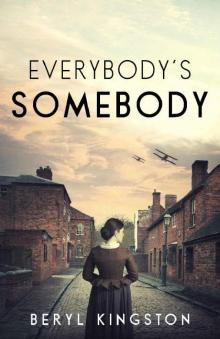 Everybody's Somebody
Everybody's Somebody Sixpenny Stalls
Sixpenny Stalls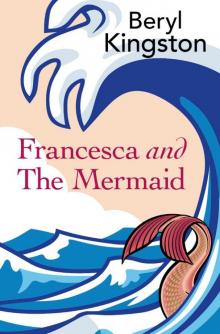 Francesca and the Mermaid
Francesca and the Mermaid Avalanche of Daisies
Avalanche of Daisies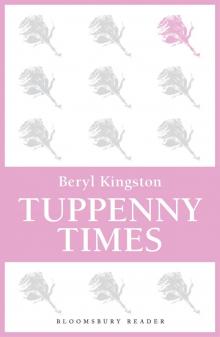 Tuppenny Times
Tuppenny Times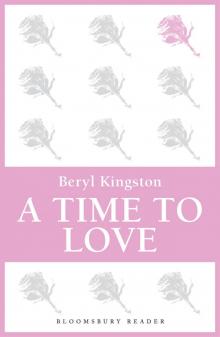 A Time to Love
A Time to Love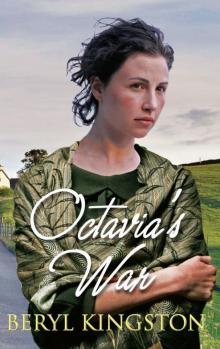 Octavia's War
Octavia's War Gemma's Journey
Gemma's Journey London Pride
London Pride Gates of Paradise
Gates of Paradise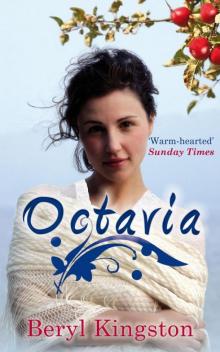 Octavia
Octavia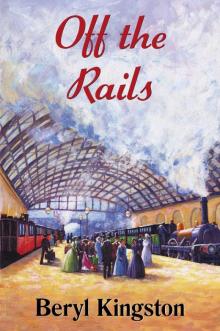 Off the Rails
Off the Rails Maggie's Boy
Maggie's Boy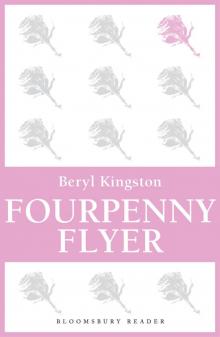 Fourpenny Flyer
Fourpenny Flyer